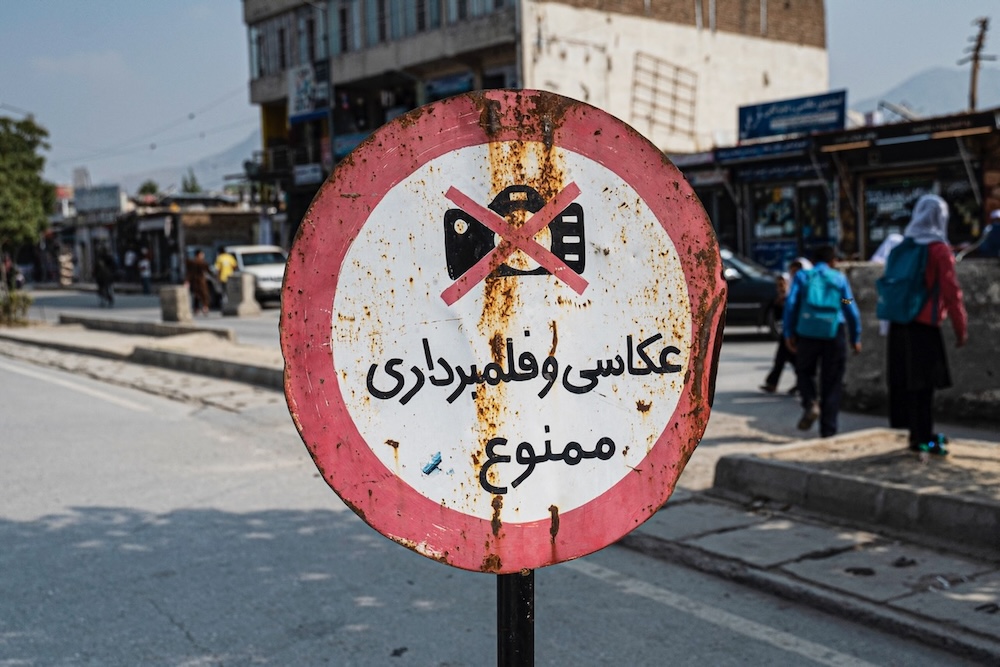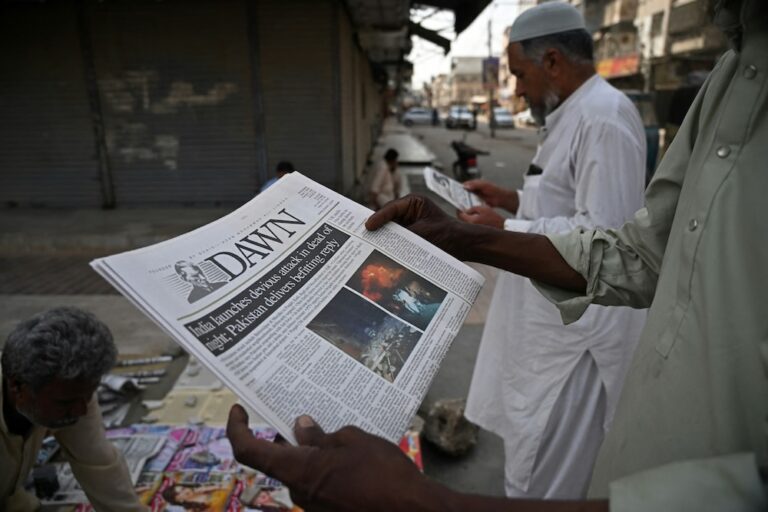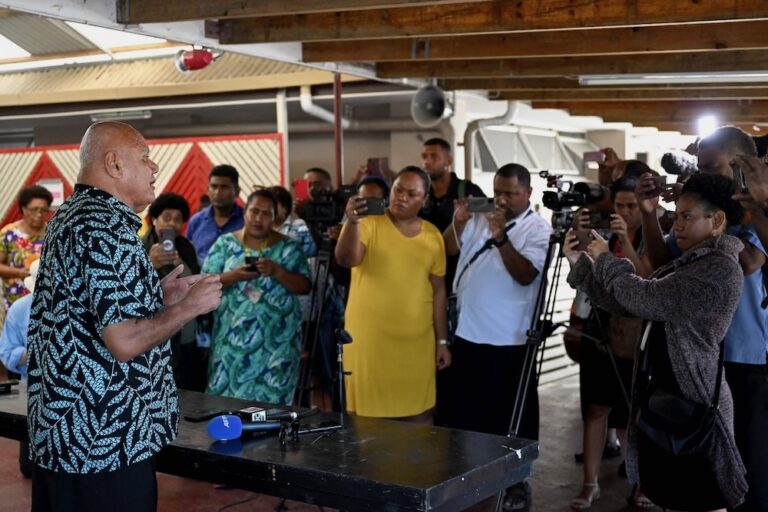December 2024 in Asia-Pacific: A free expression and civic space round-up produced by IFEX's regional editor Mong Palatino, based on IFEX member reports and news from the region
The last month of 2024 was marked with media killings, court convictions, passage of repressive laws, and TV and radio closures as groups push for media freedom across Asia-Pacific.
Journalist killings in Cambodia and Pakistan
Journalist Chhoeung Chheng, who had previously reported on deforestation in Boeung Per nature reserve, was killed in Cambodia. Civil society groups, including several IFEX members, underscored in a joint statement that “this repression has been directed at journalists covering sensitive issues like environmental destruction, human trafficking, forced labour and crime in the country.” The statement also linked the murder to the overall decline of free speech in the country. “This horrific murder follows years of vilification, threats and imprisonment of journalists in Cambodia, increasing the impunity around crimes against them.”
For more on this kind of persecution in Cambodia and how civil society is working to counter it, see my earlier piece “Criticism and climate care are under attack in Cambodia – but communities are fighting back”.
In Pakistan, journalist Malik Zafar Iqbal Naich was killed while distributing newspapers in Punjab province. The Committee to Protect Journalists (CPJ) listed the incident as the 11th case of media-related killings in 2024 in the country. So far, CPJ has confirmed that three of the murder cases were in retaliation for the work of journalists.
China, Thailand, and India: Silencing and persecution of critical voices
The X account of ‘Teacher Li is not Your Teacher’ (李老师不是你老师) was subjected to a shadow ban (restricting the reach of an account) in November and December coinciding with the second anniversary of the White Paper protests in China. ARTICLE 19 reported that searching the account on X revealed multiple impersonator accounts and over 900 impersonator account results for the Chinese username. Li Ying, the owner of the account based in Italy, has faced digital transnational repression over the past two years after he became a popular and credible source for information about local protests in China.
Veteran Chinese journalist Dong Yuyu was sentenced to seven years in prison on trumped-up espionage charges, more than two years after he was arrested in Beijing while having a lunch meeting with a Japanese diplomat. Cédric Alviani, the Asia-Pacific bureau director of Reporters Without Borders (RSF), decried the charges as “absurd”.
“Maintaining relationships with foreign diplomats and academics is a normal part of a journalist’s work, and labelling these connections as espionage is just absurd,” he said in a statement. According to RSF’s tally, there are 123 journalists and press freedom defenders currently detained by the Chinese regime.
PEN America has expressed concern over the sixth lèse-majesté (anti-Royal Insult law) conviction of Thai poet and human rights lawyer Arnon Nampa. Aside from lèse-majesté, sedition charges were also filed against him for his speech in a peaceful protest in 2020. His cumulative prison sentence is now 18 years, 10 months, and 20 days. His lengthy prison sentence highlights the weaponisation of the law to detain monarchy critics and pro-democracy activists in Thailand.
IFEX joined Index on Censorship and other human rights groups in condemning the sedition complaint against Indian journalist Mohammed Zubair in connection to the comments he posted on X about the controversial statements of an influential Hindu priest in India. The updated and “modernised” version of India’s sedition law was cited in the complaint which reflects the continued use of draconian laws to stifle criticism.
TV and radio closures in Afghanistan
The Afghanistan Journalists Center (AFJC) reported that 12 TV stations were forced to close operations in 2024 following the imposition of strict media directives by the government. This does not include the raid in December 2024 on Arezo TV, which was accused of broadcasting programs “contrary to Islamic values”.
Since returning to power in 2021, the Taliban has issued 21 media directives, which AFJC assailed as “extralegal” and for causing “widespread media closures” while severely hindering the practice of journalism. Women, in particular, were prohibited from appearing in state-owned channels and removed from entertainment programs.
The passage of the Vice and Virtue Law enabled the “morality police” represented by the General Directorate of Intelligence and the Ministry of Vice and Virtue “to dictate standards for the public, including media personnel.” Some of the new restrictions included a ban on music, the publication of images of living beings, and the live broadcast of political programs. This led to the temporary closure of at least three radio stations, which were not permitted to broadcast music and accept calls from women.
Malaysia: “Entrenching state control over the internet”
The Malaysian parliament passed the Online Safety Bill and a measure amending the Communications and Multimedia Act (CMA) 1998 amid concerns from civil society groups that these would undermine free speech in the country.
The CMA amendments would expand the powers of the Malaysian Communication and Multimedia Commission “to decide what kind of content is to be online and removed” and “to compel service providers to provide user data” without a judicial order. Meanwhile, the Online Safety Bill is intended to make online service providers and social media platforms accountable.
But the Center for Independent Journalism (CIJ Malaysia) and other civil society groups have expressed concern that “this opens the door for the government to exploit or manipulate companies’ content moderation systems to censor unwanted speech.” They added that “these measures risk transforming Malaysia’s digital spaces into stricter and highly regulated environments, stifling open discourse and innovation while entrenching state control over the internet.”
On the other hand, the decision to table the Malaysian Media Council (MMC) Bill in Parliament was welcomed by civil society groups, since it provides for a multistakeholder and self-regulatory mechanism to address media concerns. One of the provisions of the bill is the setting up of a grievance mechanism to manage complaints against the media. Legislators are urged to amend some sections of the bill like removing the inclusion of government representatives in the board. Press freedom advocates also bemoaned the lack of commitment to amend or repeal existing draconian laws.
Review of new measures in Mongolia, Australia, and Vietnam
RSF welcomed the Mongolian government’s draft law on press freedom, describing it as a “positive step forward to ensure the freedom, independence, and plurality of Mongolian journalism.” It listed some recommendations to enhance the bill, such as “clarify the definition of journalism, guarantee media independence, enhance source protection, promote self-regulation standards, and increase transparency in media ownership and funding.”
Paige Collings of the Electronic Frontier Foundation (EFF) reviewed Australia’s new law, which bans children under the age of 16 from using social media. Citing privacy concerns on mandatory age verification, she warned that “this legislation will be a net loss for both young people and adults who rely on the internet to find community and themselves.” She added that it is a “wrong approach to protecting young people online, and this bill was hastily pushed through the Parliament.”
Vietnam’s Decree 147 took effect in December which expands the provisions of the 2018 Law on Cybersecurity by empowering authorities to control access to information on the internet for vaguely defined reasons of “national security” and “social order”. Human Rights Watch pointed out that since any criticism of the ruling party is considered a national security concern, “this decree will provide (authorities) with yet another tool to suppress dissent.” It added that the provision requiring verification of users could expose the identity of dissidents.
New & Noteworthy: Interviews, initiatives, investigative reports
David Greene of EFF interviewed Prasanth Sugathan, legal Director at SFLC.in, who discussed how the enforcement of repressive laws is undermining free speech in India.
“We’ve had many instances of nonprofit organizations and journalists being targeted. So there is a kind of chilling effect when you really don’t want to say something you would otherwise say strongly. There is always a toning down of what you want to say.”
Ananya Bhasin of CPJ interviewed Faisal Karimi and Wahab Siddiqi of the Afghanistan Women’s News Agency about the importance of amplifying women’s voices amid the harsh restrictions imposed by the Taliban in Afghanistan.
“The Taliban has shut off all the doors that were once available for Afghan women and together, we are trying to pry them open… There is a lack of female-run media. We have bypassed the Taliban firewall by providing information from exile to empower people within the country, especially women.”
Free Press Unlimited and ARTICLE 19 have collaborated with civil society groups in Bangladesh and Nepal “to promote the social inclusion of gender-diverse populations through media interventions.” This led to the drafting of the Inclusive Media Policy to support the Hijra community in Bangladesh. The recommendations of the policy include the following:
- Feature inspiring Hijra role models;
- Establish anti-discrimination guidelines for media coverage;
- Provide workshops for journalists on Hijra community issues
Media Matters for Democracy and its partners organised the second Sahafi Summit in Lahore, which served as a “forum for innovation and reflection on the evolving challenges and opportunities within journalism in Pakistan and the region.” The theme of the 2024 conference underscored “the vital role young media practitioners play in shaping the future of journalism.” Its statement of intent highlighted the following objectives:
- Create an enabling environment for journalism
- Strengthen collaboration between media, practitioners, and academia
- Foster a gender-sensitive and feminist media environment
- Engage in collective advocacy
- Bridge academia and industry for journalistic and academic excellence
- Promote skills-based and practical training
Digital Rights Foundation (DRF) has two insightful reports on the failure of tech companies to combat disinformation and hate speech in Pakistan. Its first report showed that political ads during the 2024 election featured “high levels of harmful and hateful content” against women and LGBTQI+ individuals. It also noted the pervasive use of Generative AI to create fake and deepfake content. It urged tech companies to step up and uphold information integrity.
DRF’s second report analysed the online attacks organised by religious extremists against women journalists and activists. It warned that online hate speech against women journalists “is not only disproportionately higher but also life threatening.” It added that “bad actors have been enabled to exploit X and other platforms to amplify technology-facilitated gender-based violence with seemingly no substantial penalties, such as blocks or bans.”
In Nepal, Freedom Forum recorded a total of 53 incidents of press freedom violations in 2024 that directly affected 92 media personnel. Its annual report also pointed out that “digital public sphere will not only shrink but also put media in constant fear” because of “rising intolerance” among political parties. It recommended the establishment of a multi-stakeholder approach to combat digital disinformation instead of relying solely on authorities who tend to misuse their mandate to harass journalists.



